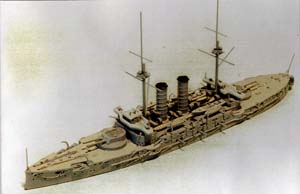 Prior
to World War Two the most famous ship in the Japanese navy was the pre-dreadnought
Mikasa.
Prior
to World War Two the most famous ship in the Japanese navy was the pre-dreadnought
Mikasa.
Laid down 24 January 1899 by Vickers in Great Britain and completed 1 March
1902, she was the most modern ship in the Japanese fleet when war broke out
in February 1904. At the time Mikasa was serving as the flagship of Admiral
Togo and she wore his flag at the battle of Tsushima.
Following the end of hostilities she was at anchor in Sasebo harbour when
her magazine exploded on 12 September 1905 and she sank. Mikasa was refloated
in August 1906 and recommissioned in 1907. In September 1921, she was reclassified
as a 1st Class Coast Defence Ship but that same month she ran aground near
Askold Island, later refloated and ultimately stricken in 1923.
In 1926 Mikasa was opened as a memorial in Yokosuka where she remained until
1945. Her condition deteriorated between 1945 and 1959, but in 1960 she was
restored and is now on display as the only surviving pre-dreadnought battleship.
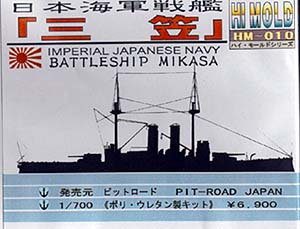 Once
again the folks at the various incarnations of Skywave/Pit-Road (or in this
case Hi-Mold) have come through with a very exceptional kit of this historic
ship. As mentioned in my previous reviews of their products all components
are securely packed in a strong box. The main pieces being rolled in bubblewrap
and taped to the sides of the box, the smaller pieces taped to the bottom.
Once
again the folks at the various incarnations of Skywave/Pit-Road (or in this
case Hi-Mold) have come through with a very exceptional kit of this historic
ship. As mentioned in my previous reviews of their products all components
are securely packed in a strong box. The main pieces being rolled in bubblewrap
and taped to the sides of the box, the smaller pieces taped to the bottom.
 The
kit consists of resin, metal (lots of metal), brass rod of various diameter,
and a fret of PE. The resin parts are cast in a resin that is easily worked
with and is not brittle in the least. It is almost akin to the styrene that
Pegasus/Blue Max use in their kits – except this is resin. The hull is in
one piece with the various details in place. These include skylights as well
as the usual anchor and chains. The wooden deck is perhaps a little overdone,
but under a coat of paint it may appear less obvious. The detail on the sides
of the hull include the shutters to the
The
kit consists of resin, metal (lots of metal), brass rod of various diameter,
and a fret of PE. The resin parts are cast in a resin that is easily worked
with and is not brittle in the least. It is almost akin to the styrene that
Pegasus/Blue Max use in their kits – except this is resin. The hull is in
one piece with the various details in place. These include skylights as well
as the usual anchor and chains. The wooden deck is perhaps a little overdone,
but under a coat of paint it may appear less obvious. The detail on the sides
of the hull include the shutters to the 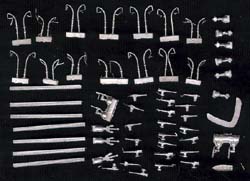 casements
in an open position.
casements
in an open position.
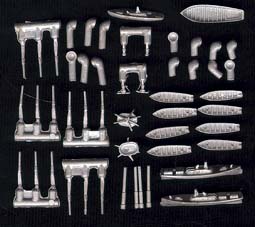 The
midships superstructure consists of two panels that fit on stubs moulded to
the upperdeck corner casements. As the midships area is open underneath these
panels and taking into account the fact that there is a slight gap in the
fit between them, it will be interesting fitting the secondary armament prior
to attachment and providing a nice finish. In front of each of these a deckhouse
is fitted to which the flying bridges are affixed. Along with the funnels,
these two bridge platforms and wheelhouse make up the rest of the superstructure.
The
midships superstructure consists of two panels that fit on stubs moulded to
the upperdeck corner casements. As the midships area is open underneath these
panels and taking into account the fact that there is a slight gap in the
fit between them, it will be interesting fitting the secondary armament prior
to attachment and providing a nice finish. In front of each of these a deckhouse
is fitted to which the flying bridges are affixed. Along with the funnels,
these two bridge platforms and wheelhouse make up the rest of the superstructure.
The remaining resin parts are the two 12" turrets. The metal parts
are very 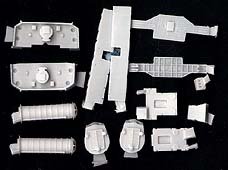 comprehensive
and include: davits, boats, spray shields, QF guns, 12" barrels, sternwalk,
vents, anchors, mast star, etc.
comprehensive
and include: davits, boats, spray shields, QF guns, 12" barrels, sternwalk,
vents, anchors, mast star, etc.
A fret of PE is included with rails, ladders and the  distinctive
sternwalk grill.
distinctive
sternwalk grill.
Three pages of instructions (in Japanese) round out the box contents. One
page shows all the parts as well as an exploded view of how they go together.
The other two pages are a 1/700 plan and profile view with all the
mast dimensions included, the final page is a 1/350 plan and side view.
Conclusion Once again a very fine kit of a significant ship that has so
far eluded kit makers. The boxtop shows a completed example in overall grey,
however I think I will do it up in the original scheme of a black hull, funnels
(with three white bands) and aft mast; white superstructure and turrets and
buff foremast. Thanks to HobbyLink Japan for
the review sample.
Copyright © SMML 2003